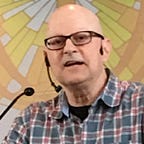A Jewish Buddhist and a Psychotherapist Find Self-Love
I grew up in a neglectful lower middle-class Jewish American family where no one taught me I was lovable. This became crystal clear yet again in discussions with my new therapist, who I will call Kathleen (because that’s her name). Yesterday, after doing a Buddhist chant together for a few minutes (she’s very open-minded), we launched into an exploration of self-love.
My parents, being somewhat self-absorbed and unaware, didn’t really have a desire or know-how to parent children. What #self-compassion pioneer researcher, Kristin Neff, describes as the human need for warmth, gentle touch and soft vocalization, was absent from my environment. As a result, I wasn’t able to develop a sense of self-worth. At some level, I believed I was a sham and not good enough. I was able to feel empathy for others. But, with the exception of my wife and daughters, I had a difficult time fully accepting that I was worthy of love.
Many decades of practicing and studying Nichiren #Buddhism helped me realize that I have a Buddha nature. By logical extension, I must be deserving of respect and compassion — especially from myself. A Buddhist friend, Danny Nagashima, said, “When you chant, you have to have the most reverence for your life… your life deserves that kind of reverence.”
While I know this intellectually, there is a hidden infant-like part of me who struggles to accept self-love. No matter how much success I experience and obstacles I overcome, I still have difficulty embracing my most vulnerable and hurt self. In other words, loving myself flaws and all.
Kathleen explained how important #self-love is to my mental and physical health since it is a powerful trigger for the release of oxytocin, the hormone that increases feelings of trust, calm, safety, generosity, and connectedness. So, I’ve been chanting to become a person with great self-compassion. She also shared how Kirstin Neff found that decreases in anxiety, shame, and guilt and increases in the willingness to express sadness, anger, and closeness were associated with higher levels of self-compassion and a decrease in self-judgement.
In Judaism there is a ritual called Tashlikh where Jews cast off their sins into a flowing body of water. Instead of discarding sins, my daily ritual, based on the Buddhist concept of changing karma, is to chant to transform my childhood traumas and the emotions and sensations associated with them into compassion, wisdom and the creation of value.
With a lot of help from therapists, fellow Buddhists, family and friends, I continue to find kinder ways to relate to myself. And, I believe I can finally say to that frightened adolescent me, with the utmost sincere intention…I forgive you…I will protect you…I love you.
